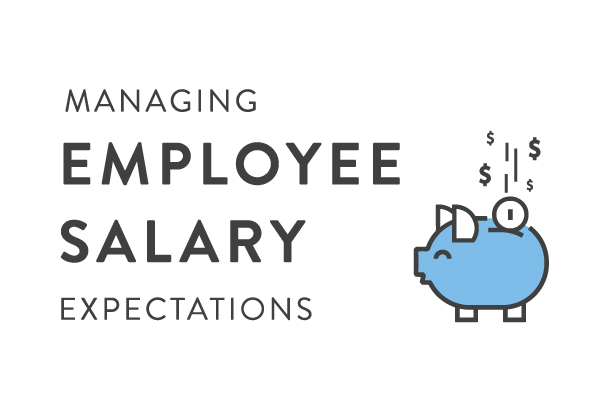As an employer, your greatest asset is the talent you hire. Consequently, your biggest challenge is attracting and retaining top talent. In today’s competitive market, managing employees’ salary expectations is a critical part of the equation.
When it comes to salary, every employee, including the highly-compensated, wants more. But due to budget restraints, that isn’t always possible. Managing employees’ salary expectations requires preparation and transparency. Here are 4 ways to help you better manage the conversation.
Do Your Homework
There are currently two certainties in the world of talent acquisition. One, people have no fear about switching jobs. Two, recruitment efforts are stronger and more ferocious than ever. The reality is your best employees are receiving recruiting notices on LinkedIn weekly, if not daily. That’s why keeping salaries competitive through annual salary benchmarking is so important.
Having data to back up your budget will leave you well-equipped when it comes to managing employees’ salary expectations. Start by analyzing salary guides to confirm your company’s compensation levels are in line with the current market. Try to reference salary guides specific to your geographical region and industry for more accurate benchmarking. Once you’ve established a baseline, compare it against what your company is offering for open positions as well as the salaries of current staff. If you identify employees who were hired under market value, it may be time to reevaluate and offer a salary correction. But keep in mind that salary guides are just a starting point. They are not meant to be absolute, but rather one of many resources to reference when making remuneration decisions.
Be Transparent
Don’t be vague with candidates about your budget for a position. Chances are you have a number in mind and know what you can (and can’t) offer. So when a candidate asks what the position pays, avoid answers like “it depends on the candidate.” The truth is, you have a reasonable range and while you may have some wiggle room, you also have limits. Be open with your candidates and have an honest discussion about what they are looking for and if that’s something you can accommodate or not. Neither candidate nor employer should go through the interview process thinking they can get the other party to agree to their terms after the fact. If you start off being upfront and honest, you’ll expedite the process of finding the best candidate that is also aligned with your budget.
Sell the Big Picture
Compensation is a key component to staying competitive. However, your company’s benefits package and perks can often make up the difference. Paid time off, 401(k) matches, health insurance, education reimbursement and bonuses should all be taken into account when managing employees’ salary expectations.
Look at each current and potential employee as an individual. Other than salary, what drives them? Identify what you offer that could serve as a tradeoff for a higher salary. For example, flexibility has become almost as valuable to employees as their salary. With more and more companies offering flexible work plans, flexibility is one of the best bargaining chips employers can play.
Additionally, one of the most important things a company can do for its employees is to actively invest in their growth. That means paying for certifications and trainings that elevate not only their knowledge but their value as well. If you can show an employee that you not only offer a salary but also invest in them and their skills so they can grow with the company, that’s pretty powerful.
Create an Increase Plan
Your employees see their salaries as a direct reflection of their value. You should recognize that it takes a lot for an employee to ask for more. If they are asking, it’s clearly important and top of mind. Not to mention if your company doesn’t offer cost of living increases, it’s hard to expect your employees to be happy with their salaries for long, even if their jobs haven’t changed much. When an employee brings up the salary issue, recognize that your employee is feeling undervalued. If you can’t come to an agreement on an increase in an immediate sense, work on creating a clear plan for how and when an increase can be achieved. Offering a plan will give your employee something to look forward to, work towards and hopefully keep them engaged.
While managing employees’ salary expectations is critical, it’s also important to note that the cost of replacing an employee is often double their salary. Sometimes you have to give more to get more.











